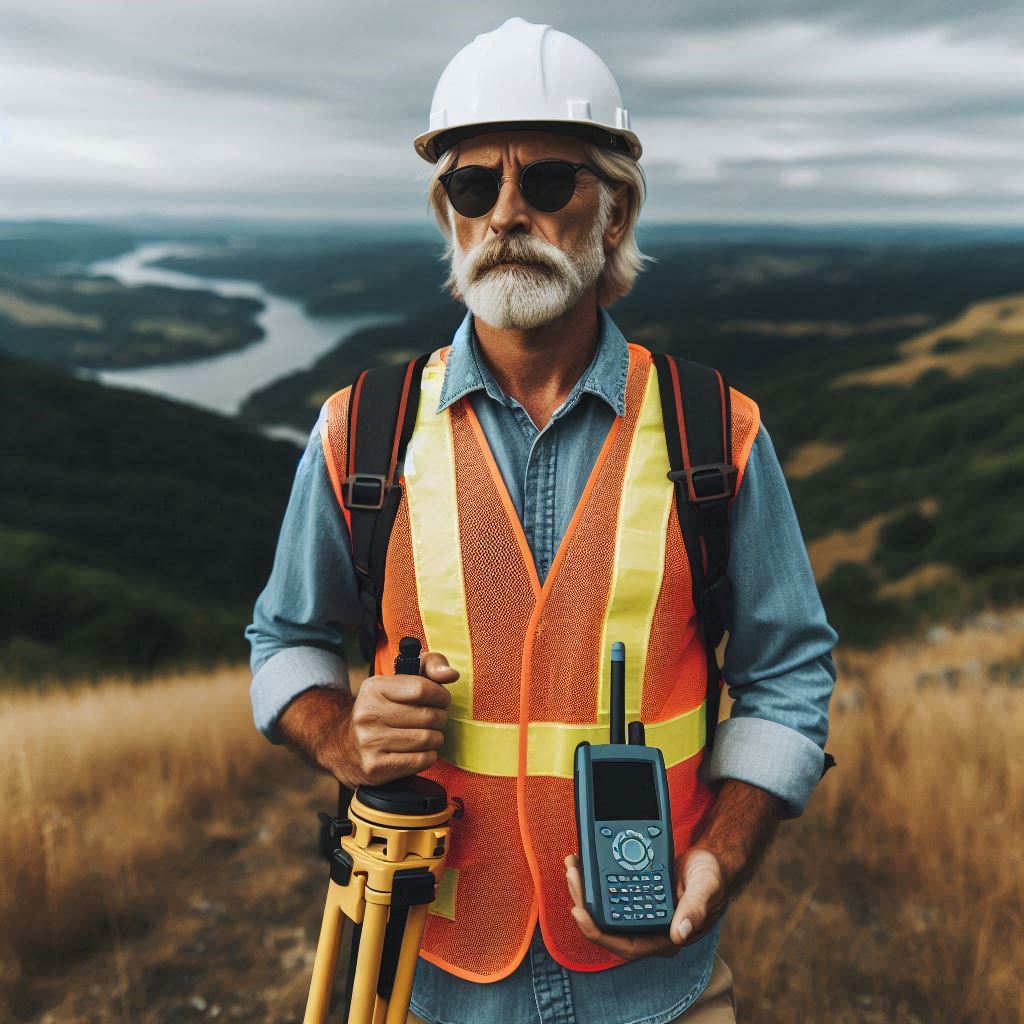Introduction
Explanation of What Surveying and Mapping Technicians Do
Surveying and mapping technicians are vital for collecting, analyzing, and managing geographic data.
They operate specialized equipment to measure land accurately, create detailed maps, and provide essential data for various projects, including construction, real estate, and environmental assessments.
Their work ensures precise property boundaries, effective infrastructure development, and proper land use planning.
Importance of Choosing the Right State for Career Growth and Opportunities
Choosing the right state for your career as a surveying and mapping technician can significantly impact your professional trajectory and job satisfaction.
Each state offers distinct advantages, such as varying job markets, salary levels, and industry demands.
Selecting a location with a strong job market and competitive salaries can enhance your career prospects and overall quality of life.
Therefore, researching state-specific factors and aligning them with your career goals and personal preferences is crucial.
By carefully considering these elements, you can find a state that offers the best opportunities for growth and success in your field.
Geographic Location
The Significance of Geographic Location When Considering the Best States for Surveying and Mapping Technicians
Geographic location is crucial when choosing the best states for surveying and mapping technicians.
States with diverse landscapes provide numerous advantages.
Technicians benefit from exposure to various terrains, enhancing their skills and expertise.
The location affects the types of projects and the equipment required.
Working in different environments builds adaptability and a broader skill set.
States with Diverse Landscapes and Varying Terrains for Different Types of Surveying Projects
States with varied landscapes offer diverse surveying challenges.
Mountains, deserts, wetlands, and urban areas each present unique requirements.
For example, mountainous regions need precise elevation measurements, while wetlands involve intricate boundary mapping.
Technicians in such states encounter a range of projects, from urban development to conservation efforts.
Diverse terrains also influence the equipment used.
Technicians might use GPS systems, drones, or traditional tools, depending on the landscape.
This variety ensures they are well-versed in different technologies and methods.
States like California and Colorado exemplify geographic diversity.
California features coastal regions, mountains, and deserts, each requiring different surveying approaches.
Colorado‘s mix of mountainous and flat areas provides varied challenges and opportunities.
Conversely, states with uniform landscapes might offer fewer diverse projects.
Technicians in these regions could face repetitive tasks, limiting their career growth.
In contrast, diverse states keep work engaging and provide more career advancement opportunities.
A state‘s geographic location significantly impacts a technician‘s career.
States with diverse landscapes offer valuable experiences and growth opportunities.
Technicians gain a comprehensive skill set by working in varied terrains, making these locations ideal for building a successful career in surveying and mapping.
Read: The Role of Aerospace Engineers in Satellite Development
Job Opportunities
States with High Demand for Surveying and Mapping Technicians
- California: California leads in demand for surveying and mapping technicians. The state’s rapid urban development, infrastructure projects, and diverse terrains drive the need for skilled professionals. Major cities like Los Angeles and San Francisco offer abundant opportunities.
- Texas: Texas has a high demand for technicians due to its large size and varied landscapes. Growth in oil, gas, and infrastructure projects fuels this demand. Cities such as Houston and Dallas are key hubs for employment.
- Florida: Florida’s booming real estate market and ongoing infrastructure developments create a strong need for surveying and mapping experts. Coastal and urban projects are prevalent, especially in cities like Miami and Orlando.
- Colorado: Colorado‘s expanding urban areas and extensive natural resources drive the need for surveying professionals. Denver and Boulder offer numerous job opportunities, particularly in development and environmental projects.
- Washington: Washington state‘s growth in technology and construction sectors boosts demand for surveying and mapping technicians. Seattle and Spokane are central to these job opportunities.
Job Market Trends and Growth Potential
- California: The job market in California is robust, with consistent growth projected in both urban and rural areas. Technicians can expect competitive salaries and a variety of project types. The state’s diverse terrain offers ongoing learning and advancement opportunities.
- Texas: Texas shows strong growth potential due to its economic expansion and infrastructure needs. The state offers numerous job prospects, particularly in the oil and gas sectors. Technicians can expect steady demand and diverse work environments.
- Florida: Florida‘s job market is growing rapidly, driven by real estate and infrastructure development. Technicians can anticipate an increase in job opportunities, especially in coastal and urban areas. The state‘s focus on expansion offers substantial career growth.
- Colorado: The market in Colorado is expanding due to urban development and environmental projects. Technicians can expect a healthy job outlook with opportunities in both city and natural resource sectors. Growth in these areas ensures a stable career path.
- Washington: Washington’s job market benefits from growth in technology and construction. The state offers a variety of projects and a favorable job outlook. Technicians in Seattle and Spokane can expect a dynamic work environment with strong growth potential.
In summary, states like California, Texas, Florida, Colorado, and Washington offer significant job opportunities for surveying and mapping technicians.
Each state‘s job market trends and growth potential reflect the diverse needs and expanding sectors in these regions.
Technicians in these states can look forward to a range of career opportunities and a positive job outlook.
Read: Aerospace Engineering in Commercial Spaceflight
Salary and Compensation
Average Salaries for Surveying and Mapping Technicians Across States
- California: California offers some of the highest average salaries for surveying and mapping technicians. Technicians in this state earn around $70,000 to $80,000 per year. High living costs in major cities like San Francisco and Los Angeles drive these competitive wages.
- Texas: In Texas, surveying and mapping technicians earn an average salary between $60,000 and $70,000 annually. The state’s lower cost of living compared to California allows for a comfortable lifestyle with competitive compensation.
- Florida: Technicians in Florida can expect to earn approximately $55,000 to $65,000 per year. While slightly lower than some other states, the salary is competitive given Florida’s lower cost of living and strong demand for professionals.
- Colorado: The average salary for surveying and mapping technicians in Colorado ranges from $65,000 to $75,000 annually. Colorado‘s high demand and cost of living in cities like Denver contribute to these figures.
- Washington: Washington state offers salaries between $65,000 and $75,000 per year. Seattle‘s high cost of living ensures that compensation remains competitive, reflecting the demand for skilled technicians.
States Offering Competitive Wages and Benefits
- California: California stands out for its high salaries and comprehensive benefits. The state’s competitive wages are complemented by robust benefits packages, including health insurance and retirement plans. The high cost of living is offset by substantial compensation.
- Texas: Texas offers attractive salaries and benefits, especially in major urban areas. While the salaries are slightly lower than California, the cost of living is also lower. Benefits typically include health insurance, paid time off, and retirement plans.
- Colorado: Colorado provides competitive salaries with additional benefits. The state‘s strong job market and moderate cost of living contribute to attractive overall compensation packages. Technicians often receive health insurance and retirement benefits.
- Washington: Washington is known for its competitive wages and comprehensive benefits. High salaries are balanced by the state’s higher living costs. Technicians in Washington often enjoy health insurance, retirement contributions, and other benefits.
- Florida: Florida offers competitive wages, though slightly lower than in California and Texas. Benefits typically include health insurance and retirement plans. The lower cost of living in Florida helps make the overall compensation package attractive.
In summary, California, Texas, Florida, Colorado, and Washington offer competitive salaries and benefits for surveying and mapping technicians. While salaries vary, each state provides substantial compensation and benefits relative to its cost of living and job market conditions.
Technicians in these states can expect favorable compensation packages and strong career prospects.
Read: The Impact of Aerospace Engineering on Modern Life

Quality of Education and Training
Availability of Training Programs and Educational Institutions
- California: California boasts numerous prestigious educational institutions offering programs in surveying and mapping. Schools like California State University and the University of California provide specialized degrees and certifications. These programs prepare technicians with robust theoretical and practical knowledge.
- Texas: Texas offers a range of training programs through institutions such as Texas A&M University and the University of Texas. These programs cover various aspects of surveying and mapping, from technical skills to advanced applications. Community colleges and technical schools also provide relevant certifications.
- Florida: Florida’s educational landscape includes programs from institutions like the University of Florida and Florida Atlantic University. These programs are designed to equip technicians with necessary skills and knowledge. Additionally, local technical schools offer certification courses for career advancement.
- Colorado: In Colorado, schools such as the University of Colorado and Colorado State University provide comprehensive surveying and mapping programs. These institutions offer both undergraduate and graduate degrees, along with specialized certifications. Technical colleges also contribute to professional training.
- Washington: Washington features educational programs from institutions like the University of Washington and Washington State University. These programs focus on practical and theoretical aspects of surveying and mapping. Community colleges also offer relevant certification courses.
Importance of Continuous Education and Professional Development
Continuous education and professional development are crucial for surveying and mapping technicians. The field constantly evolves with new technologies and methods.
Ongoing training helps technicians stay updated with the latest advancements and best practices.
- Adapting to New Technologies: Surveying and mapping techniques are continually advancing. Continuous education allows technicians to learn about new tools, such as advanced GPS systems and drones. Staying current with these technologies ensures efficiency and accuracy in their work.
- Maintaining Certifications: Many states require surveying and mapping technicians to hold certifications that must be renewed periodically. Continuous professional development helps technicians meet these requirements and maintain their credentials.
- Career Advancement: Ongoing education opens doors for career advancement. Technicians who pursue additional certifications or advanced degrees often qualify for higher-level positions and specialized roles. This leads to better job prospects and increased earning potential.
- Networking Opportunities: Professional development courses and workshops provide opportunities to network with peers and industry leaders. Building a strong professional network can lead to new job opportunities and collaborations.
- Staying Competitive: In a competitive job market, continuous learning helps technicians stand out. Employers value candidates who demonstrate a commitment to ongoing education and professional growth.
The availability of quality educational programs varies by state, with California, Texas, Florida, Colorado, and Washington offering robust options for surveying and mapping technicians.
Continuous education and professional development are essential for staying current, advancing careers, and maintaining certifications.
Technicians who engage in ongoing learning are better equipped to excel in a dynamic and evolving field.
State Regulations and Licensing
Role of State Regulations and Licensing Requirements
State regulations and licensing requirements play a crucial role in the profession of surveying and mapping technicians.
These regulations ensure that technicians adhere to industry standards and maintain high levels of competence and professionalism.
Licensing often involves meeting educational qualifications, passing exams, and gaining practical experience.
- Ensuring Competency: Licensing requirements help guarantee that surveying and mapping technicians have the necessary skills and knowledge. These standards protect the public by ensuring that professionals can perform accurate and reliable work.
- Standardizing Practices: Regulations provide a uniform framework for surveying practices. This standardization helps maintain consistency in the quality of work across different states and projects.
- Legal Compliance: Licensed technicians are authorized to perform certain legal functions, such as property boundary determinations and land surveys. Compliance with state regulations ensures that their work is legally valid and recognized.
- Career Advancement: Licensing is often required for career advancement. Higher-level positions or specialized roles may necessitate advanced certifications or licenses. This process helps technicians advance their careers and pursue additional opportunities.
States with Strict Licensing Standards
- California: California has stringent licensing requirements for surveying and mapping technicians. The state mandates that technicians pass the Professional Land Surveyor (PLS) exam and complete specific educational and experience criteria. These strict standards ensure high-quality work and professionalism.
- Texas: Texas also enforces strict licensing requirements. Technicians must pass the Texas Board of Professional Land Surveying (TBPLS) exam and meet educational and practical experience standards. This rigorous process enhances the credibility of professionals in the state.
- New York: New York has detailed licensing requirements, including passing the Fundamentals of Surveying (FS) exam and the Principles and Practice of Surveying (PPS) exam. Technicians must also complete specific educational and experience prerequisites.
- Florida: Florida‘s licensing standards require technicians to pass the Florida Board of Professional Surveyors and Mappers (FBPSM) exam and meet educational and practical experience requirements. These standards ensure that professionals are well-qualified.
- Washington: Washington state has comprehensive licensing requirements. Technicians must pass the Washington State Land Surveyor‘s exam and meet educational and experience criteria. These regulations help maintain high standards in surveying practices.
Impact on Career Opportunities
Strict licensing standards impact career opportunities in several ways:
- Increased Credibility: Technicians with licenses from states with strict standards are often viewed as more credible and skilled. This increased credibility can lead to better job prospects and higher-paying positions.
- Regulatory Compliance: Strict licensing ensures that technicians are compliant with state regulations, making their work legally recognized and accepted. This compliance is essential for handling projects that require official documentation and validation.
- Professional Development: Technicians in states with stringent requirements often have access to advanced professional development opportunities. This can lead to career growth and specialization in various areas of surveying and mapping.
- Competitive Edge: Licensed technicians from states with rigorous standards often have a competitive edge in the job market. Employers value the higher level of training and expertise that comes with strict licensing requirements.
In summary, state regulations and licensing requirements are crucial for maintaining standards in surveying and mapping.
States with strict licensing standards, such as California, Texas, New York, Florida, and Washington, ensure high levels of competence and professionalism.
These regulations impact career opportunities by enhancing credibility, ensuring regulatory compliance, and providing a competitive edge in the job market.
Read: Graduate Studies in Biomedical Engineering
Uncover the Details: Environmental Engineering: Public vs. Private Sector Jobs
Networking and Professional Organizations
States with Active Surveying and Mapping Communities
- California: California has a vibrant surveying and mapping community, supported by organizations like the California Land Surveyors Association (CLSA). The state hosts numerous industry events, conferences, and workshops that facilitate networking and professional growth.
- Texas: Texas boasts a robust surveying community with organizations such as the Texas Society of Professional Surveyors (TSPS). The state offers various networking opportunities, including regional meetings and annual conferences.
- Florida: Florida‘s surveying and mapping community is active and well-supported by the Florida Surveying and Mapping Society (FSMS). The state hosts local chapters and events that provide valuable networking opportunities and professional development.
- Colorado: Colorado has a strong surveying community with support from organizations like the Professional Land Surveyors of Colorado (PLSC). The state offers numerous events and seminars to connect professionals and advance their skills.
- Washington: Washington‘s surveying and mapping community is active, with organizations such as the Washington Association of Land Surveyors (WALS). The state provides opportunities for networking through conferences, workshops, and regional meetings.
Benefits of Networking and Joining Professional Organizations
- Career Advancement: Networking through professional organizations can open doors to new job opportunities. Connecting with industry peers and leaders often leads to job referrals and insider knowledge about open positions.
- Professional Development: Organizations frequently offer continuing education opportunities, such as workshops, seminars, and certification courses. These resources help technicians stay updated on industry trends and enhance their skills.
- Knowledge Sharing: Being part of a professional community allows technicians to share experiences and knowledge. This exchange of ideas can lead to new insights and solutions for common challenges in the field.
- Industry Updates: Professional organizations provide updates on industry standards, regulations, and technological advancements. Staying informed through these organizations helps technicians remain competitive and compliant with current practices.
- Networking Opportunities: Events and conferences hosted by professional organizations offer opportunities to build relationships with peers and industry leaders. These connections can be valuable for collaboration, mentorship, and career growth.
- Advocacy and Support: Professional organizations often advocate for the interests of their members, including lobbying for better regulations and standards. Membership provides access to resources and support that can help navigate industry challenges.
- Professional Recognition: Being an active member of a professional organization can enhance a technician‘s credibility and professional standing. Membership and participation in industry groups are often viewed favorably by employers and clients.
States like California, Texas, Florida, Colorado, and Washington have active surveying and mapping communities supported by professional organizations.
Joining these organizations and engaging in networking offers numerous benefits, including career advancement, professional development, and valuable industry connections.
Participation in professional groups helps technicians stay informed, gain new skills, and advance their careers.
Work-Life Balance
Factors Affecting Work-Life Balance
- Cost of Living: The cost of living significantly impacts work-life balance. High living expenses can strain finances, affecting overall quality of life. States with lower costs of living offer more affordable housing, goods, and services, contributing to a better work-life balance.
- Commute Times: Long commutes can negatively affect work-life balance by reducing personal time and increasing stress. States with efficient public transportation systems and shorter commute times contribute to a more balanced lifestyle.
- Overall Quality of Life: Factors such as access to recreational activities, healthcare, and education impact overall quality of life. States that offer a high quality of life contribute to a better work-life balance for professionals.
States Offering a Good Work-Life Balance for Surveying and Mapping Technicians
- Colorado: Colorado is known for its high quality of life and work-life balance. The state offers beautiful natural landscapes, outdoor recreational opportunities, and a moderate cost of living. Cities like Denver and Boulder have efficient public transportation and shorter commutes, contributing to a balanced lifestyle.
- Washington: Washington state, particularly in cities like Seattle, provides a good work-life balance. The state features a high quality of life with access to outdoor activities, cultural events, and excellent healthcare. Although Seattle‘s cost of living is high, the state‘s natural beauty and amenities enhance overall quality of life.
- Texas: Texas offers a favorable work-life balance with its lower cost of living and diverse cities. Cities like Austin and Dallas provide ample recreational options, shorter commutes, and affordable housing. Texas‘s warm climate and vibrant cultural scene also contribute to a balanced lifestyle.
- Florida: Florida provides a good work-life balance due to its lower cost of living, warm climate, and recreational opportunities. Cities like Orlando and Tampa offer a variety of activities and amenities, while affordable housing and shorter commutes enhance quality of life.
- North Carolina: North Carolina offers a balanced lifestyle with a moderate cost of living and a range of outdoor activities. Cities like Charlotte and Raleigh provide a good quality of life with efficient commutes and access to cultural and recreational amenities.
In summary, states such as Colorado, Washington, Texas, Florida, and North Carolina offer a good work-life balance for surveying and mapping technicians.
Factors such as cost of living, commute times, and overall quality of life play a crucial role in achieving a balanced lifestyle.
These states provide a mix of affordable living, efficient commutes, and recreational opportunities, contributing to a more fulfilling work-life balance for professionals in the field.
Conclusion
Key Points Discussed in the Blog Post
To sum up, the best states for surveying and mapping technicians feature strong job markets, competitive salaries, and thriving industries.
California and Texas offer substantial job opportunities and high pay scales.
Florida and Colorado provide a favorable mix of employment prospects and quality of life.
We examined various factors such as job market trends, salary expectations, and regional industry demands.
Encouragement to Research Further and Consider Their Individual Preferences
As you evaluate your options, research each state‘s specific advantages and challenges.
Assess your career goals, lifestyle preferences, and long-term aspirations to make the best choice for your future.
Each state presents unique opportunities that can significantly impact your career and personal satisfaction.
Tailoring your decision to align with your priorities will ensure a more fulfilling and successful career.
Dive deeper into state-specific data and consider how each location matches your professional and personal needs.
Your ideal state is out there‘find it by exploring and comparing your options thoroughly.
Transform Your Career Today
Unlock a personalized career strategy that drives real results. Get tailored advice and a roadmap designed just for you.
Start Now[E-Books for Sale]
The Big Book of 500 High-Paying Jobs in America: Unlock Your Earning Potential
$19.99 • 500 High-Paying Jobs • 330 pages
Explore 500 high-paying jobs in America and learn how to boost your career, earn more, and achieve success!
See All 500 High-Paying Jobs of this E-Book
1001 Professions Without a Degree: High-Paying American Jobs You Can Start Now
$19.99 • 1001 Professions Without a Degree • 174 pages
Discover 1001 high-paying jobs without a degree! Unlock career tips, skills, and success strategies for just $19.99!




